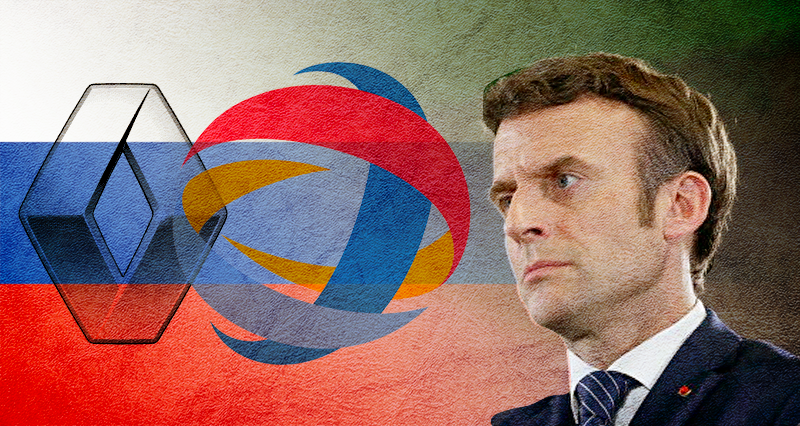The French capital and enterprises feel discomfort of the sanctions imposed by the US against Russia.
Total, Donone, Auchan, Leroy, Merlin and other companies are dragging feet to in retreating from the Russian market despite US insistence. Renault has declared to stop operations in Russia in a last minute decision.
Pro-Atlantic forces in France meanwhile continue their pressures and even threats against these companies.
“Macron is not able to make his voice heard by French companies”
The right-wing newspaper Le Monde and the left-liberal publication Liberation meanwhile publish increasingly calls to boycott those French companies such as Renault ant other that do not comply with the sanctions. The newspaper La Croix, considered to be the Vatican’s voice in France, even asked in its headline whether Total, a company that rejects to comply with sanctions, could be trialed on participating in war crimes.
European Union officials, who do “not want to be mentioned by name” deliver statements especially to the British press, commenting that French President Macron “is not able to make his voice heard by French companies”. They also accuse those French companies that continue operations in Russia of being “voracious”.
While all this is ongoing, Russian Foreign Minister Lavrov spoke to the Russian news outlet RBK: “Europe is ready to accept the global order presented by the United States under any circumstance. (…) It is only Macron who reminds of the need for an independent strategy for the European Union. All other member countries have long kneeled down before the US.”
Lavrov’s statement shows that Russia follows the strategy of deepening frictions in the opposing (Western) camp.
As we have forecasted in previous articles, restoring relations with European counterparts will be the primary goal for Russian diplomats once the storm is over. The Europeans are struggling with a deep economic crisis, and it seems very improbable they would reject such an offer.
Let us also note in that context the statement of Josep Borrell, who leads the European foreign policy: “We have committed errors in the relations with Russia.”
The elections and French capital
While evaluating these developments, it is useful to remember that France is heading to the first round of presidential elections within few weeks.
It is quite normal that all influential political forces, including the French companies, want to maintain their given status until the elections are over.
We can make same assessment for Macron too, a student of Jacques Attali, who has had very close ties to the Atlantic. Macron does not want to deepen the economic crisis, which is already affecting the country, by imposing sanctions on Russia.
The main question is: Will this approach be continued after the elections?
Macron leads the polls currently. But the final result will depend on who will be his competitor in the second round.
Right wing votes are divided between Marine Le Pen, Eric Zemmour and Valerie Pecresse. Though very unlikely that she makes it to the second round, Pecresse would have a greater chance than Le Pen or Zemmour to beat Macron.
Pecresse has a more distanced position towards Russia than Le Pen and Zemmour. But still, the influence of French capital and companies on the country’s right can change her policies.
French – Russian relations would regain momentum if Le Pen or Zemmour were elected as president.
Breaking points from ‘Rothschild’s Banker’ to Saudi Arabia
What happens in France is a result of the change of balance between West and East, crystallized in the Ukraine crisis.
Though considered a “banker for Rothschild”, Macron has taken initiatives close to Moscow. Though part of the Anglo-Saxon alliance since its foundation, the Saudi Government follows the tide and decides to organize oil trade with China using the Yuan. Both positions seem to resemble each other.
Israel’s distanced stance concerning sanctions on Russia or the conversion of India into an intensive trade partner of Russia can also be evaluated as examples of this process.
Returning to this articles point of departure: Let us emphasize that it is a matter of discussion how far can the French capital pressure the US in the matter of sanctions of Russia.
While seeking the answer for this question, we should not forget: The Champs Elysee is today not inhabited by Charles de Gaulle, and the French people – just as its European neighbors – has been exposed to pro-Atlantic propaganda of the kind of Marshall aid for many years.
Yes, the world is changing.
And while the world is changing, contradictions of the old world are replaced by new ones.

















Leave a Reply